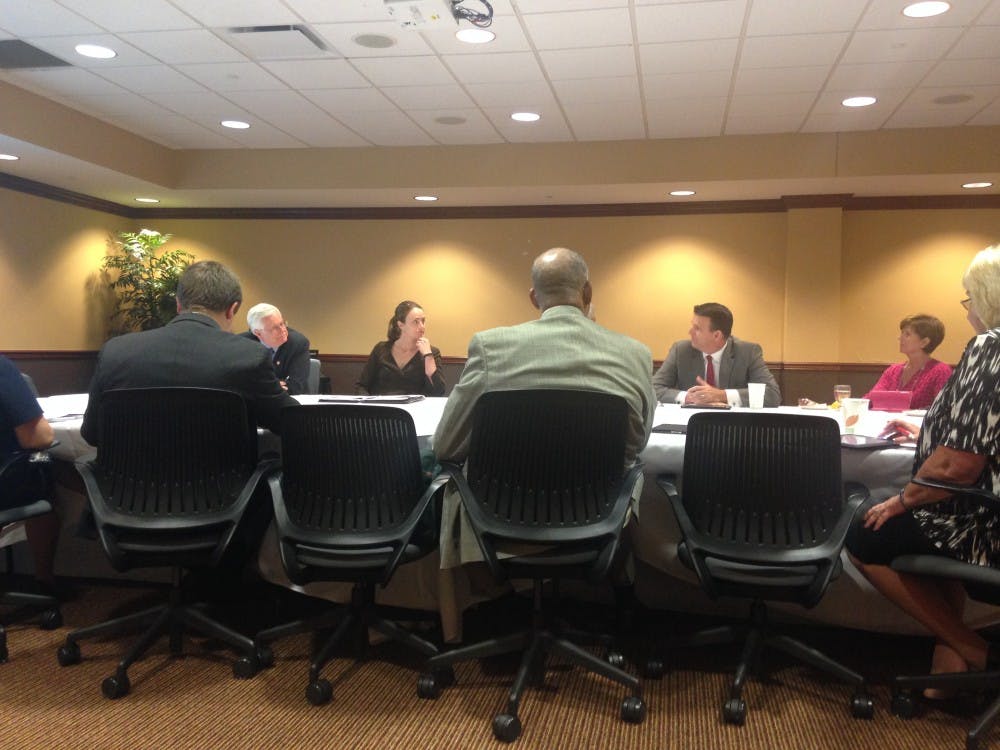If WIPB moves to Low VHF: $208 million
If WIPB moves to High VHF: $111 million
Ball State could make up to $277 million by selling its broadcast rights to air WIPB, the university's PBS-member television station.
That number — more than 20 times the $13 million the school lost from a widely publicized fraud case in 2008 — is also equivalent to 80 percent of the university’s $342 million budget from the 2014-15 school year.
However, if the Board of Trustees approve the sale, that number could be far lower because of the way the government’s “reverse auction” works.
WIPB’s license is held by the Board of Trustees, who authorized President Paul W. Ferguson last month to look into participating in the auction.
Phil Repp, now the interim dean of the College of Architecture and Planning, spoke with the trustees in his previous position as vice president of information technology.
"Full participation in the auction is only on the condition that it is in the best interest of the university,” Repp said in a university news release.
The university said it would examine a possible sale, “to determine whether Ball State can fulfill its commitment to quality participation in Indiana public broadcasting and whether the university can fully achieve its academic mission, should the auction be completed.”
According to university spokesperson, Joan Todd, she cannot speculate what the university will do. The main factor is deciding what is in the best interest of the university going forward.
The Expanding Opportunities for Broadcasters Coalition found the FCC did stick to the initial bid price for a handful of stations, according to the Business of Television Broadcasting and Cable.
Over 2,000 stations are eligible to participate in the auction, and Bowling Green State University decided in mid-September to include itself in the mix to either share a channel with another station or switch to a very high frequency (VHF) channel.
Their university station, WBGU-TV, has operated as a public station since 1964. However, plans to join the auction do not mean the station will go off air.
David Kielmeyer, interim chief communications officer at Bowling Green, said he believes this is a once-in-a-lifetime opportunity.
“It’s certainly at this point too good of an opportunity to pass up, so we do plan on participating in a way that keeps [the] station on air and continues to serve the community and at the same time continues to serve our telecommunications program,” Kielmeyer said.
According to the FCC release of bid prices, the value of the spectrum could generate a little over $140 million if it moved to Low VHF. If it moved to High VHF, it could generate a little over $103 million
“Any new revenue we’re going to invest back into students either through scholarships or the academic programs,” Kielmeyer said.
The drive for the decision to participate in the auction was based around the growing demand for wireless data, Kielmeyer said. This auction could make more airwaves available for wireless providers. The FCC has conducted these types of auctions since 1994.
Participants in the auction have several options they can choose. They can completely give up all rights, partner with another station and share spectrum or have the FCC find the participant a place in the VHF spectrum to stay on air. Participants can back out at any time.
“If we move to high VHF, which is channels seven to 13, there will be no signal concerns at all," Kielmeyer said. “Low VHF, the regions are the same, but is more susceptible to interference, so there's potential issues there.”
Butler University has gone through a similar process already in the early 90s when the university sold the rights to their radio station.
Butler alum Scott Bridge was the news and sports director at their radio station, WAJC, in 1993 when the university sold it.
“It was quite controversial at the time; frankly, there are still alums today that aren’t happy,” Bridge said.




